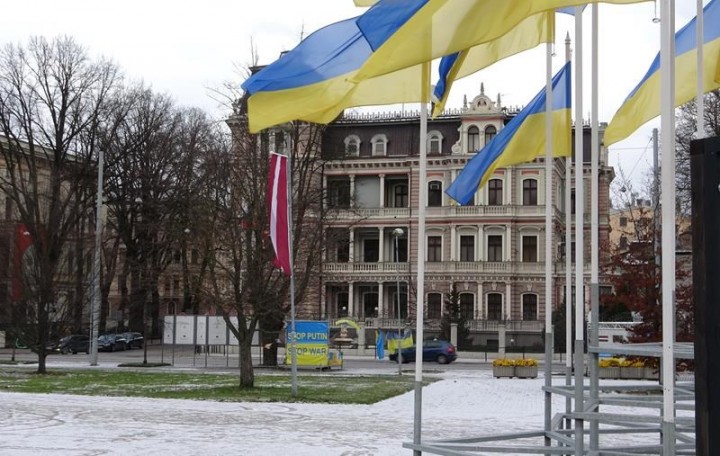RIGA, Latvia — The Ukrainian flag can be seen flying almost everywhere in the central neighbourhoods of Riga, the Latvian capital. Across from the Russian embassy, a giant portrait of Russian President Vladimir Putin styled as a skull hangs from the side of a building, a striking image on a grey winter’s day.
In Latvia, support for the Ukrainian resistance is unyielding.
“In our case, we still have this historical memory,” said Janis Garisons, state secretary in Latvia’s Ministry of Defence.
He recalled in a recent interview that his country lived through a painful Soviet annexation led by Josef Stalin in 1939. His father and uncle had to take refuge in another home at the time because their parents were deported by the Soviets. Most Latvians have similar stories of pillage, deportation and brutality in their families.
“Here, everybody, the majority have those stories,” Garisons said. That explains the fierce hostility felt in Latvia toward Putin’s Russia, with which it shares a long border.
“We know what it means when the Russians come,” he said. “Therefore, we don’t have any illusions on that.”
From the Russian embassy, in an elegant villa near Riga’s downtown, a dozen Ukrainian flags are visible fluttering in the wind outside the conference centre across the street. Out the other side of the building hangs the sinister image of a skeletal Putin against a blood-red background.
Even the name of the street on which the embassy resides has been changed to Independent Ukraine Street, no doubt a source of irritation for Russian embassy staff with each letter or parcel received.
On a busy street nearby, there is a large canvas with a Christ-like figure of a woman, evoking a Ukrainian martyr, on a backdrop of the blue and yellow Ukrainian flag. The image is walking distance, across a park, from the domed Russian Orthodox cathedral, attended by many Russian speakers.
Latvia was part of the Russian Empire until the end of the First World War, and the country’s Russian minority makes up 34 per cent of the population. The Russian influence is visible everywhere in Riga’s architecture and statues. Russian can be heard frequently in Riga’s streets, and signs, posters and menus are in both Latvian and Russian. It is not on account of Russian tourists, as Latvia has restricted access to Russians.
Asked about the loyalties of the Russian minority, Col. Didzis Nestro of the Latvian army says loyalty is a difficult concept to measure. Russian-speaking Latvians are well integrated and “are loyal,” even if some have “different opinions,” he said in an interview.
The war of attrition taking shape on the Ukrainian front is taking a toll on nearby countries, as energy costs shoot up. But Lt.-Col. Jérémie Gauvreau of the Canadian Army, deputy commander of Task Force Latvia, has confidence in the determination of Latvians — as well as their Baltic neighbours Estonia and Lithuania — who long suffered under the Russian yoke.
Gauvreau, who has been in Latvia for three years, says Baltic countries had been sounding the alarm about Russia for years, adding that they do not want to surrender an inch of territory.
Garisons said Latvians remain unshakable. “Everyone understands that the winter will not be easy and that Putin’s strategy is to freeze Europe,” he said. But it will take a lot more than that for Latvian support to falter.
“Everybody understands the consequences,” he said. “If the Ukrainians lose then we are the next.”
This report by The Canadian Press was first published Nov. 22, 2022.
— Patrice Bergeron is a Quebec-based journalist with The Canadian Press. In addition to two decades of political and general news experience, he was a CP war correspondent in Afghanistan in 2009.
Patrice Bergeron, The Canadian Press
